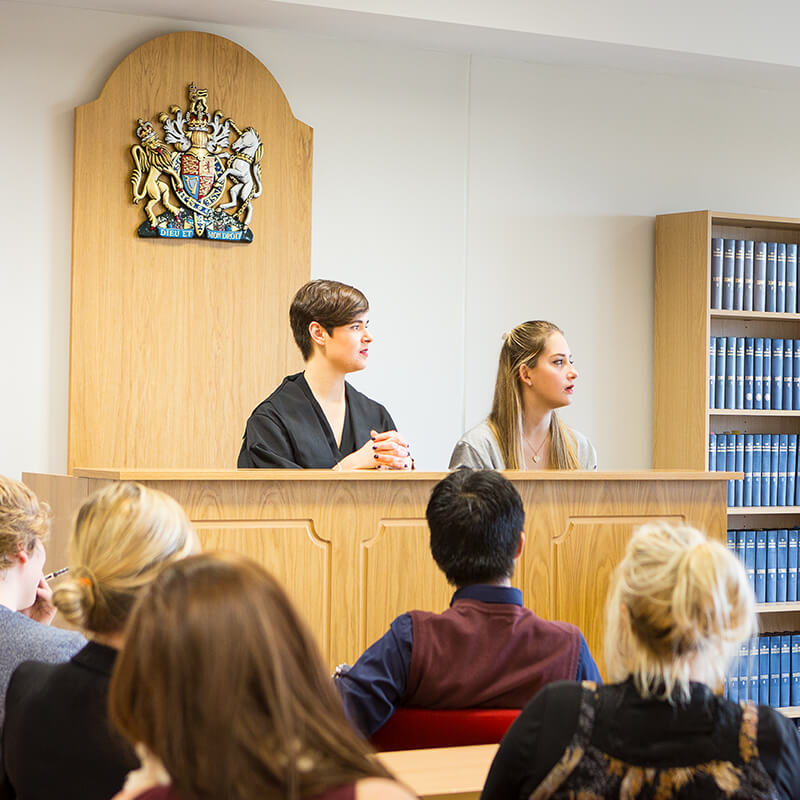/ Foundation /
Start date:
September 2025
January 2026
Entry tariff:
Foundation Year: 64–80 UCAS points (or equivalent)
UCAS code:
M2FS

Get ready to succeed in your law degree, and learn core academic and professional skills, while also developing your English language skills.
Did you know
You'll develop your English language skills and gain the academic skills and law knowledge you need for your chosen undergraduate degree.
Top 3 modern university in London
(Complete University Guide 2025)

Ranked in the top 15% in the world
Times Higher Education Young University Rankings 2024

#8 in England for undergraduate student satisfaction
National Student Survey 2024

Modules
30 credits
You will develop your core academic and integrated English language skills of speaking, listening, reading and writing. You will become familiar with key academic skills and concepts, such as referencing methods and awareness of academic integrity and tone. You will apply these skills and knowledge to both broad topics and also your chosen subject pathway.
Teaching and Learning
You will be required to actively engage in on-campus learning for up to 10 hours a week.
You will be taught through a full range of teaching and learning methods, which include lectures, seminars, workshops, discussion groups, group directed tasks and presentations. This will enable you to learn from your peers and tutors in both structured and information settings.
You will be encouraged to think creatively about your approach to learning and discussions with your peers. You will also have access to recordings, resources, links and signposting through Moodle to enrich your learning.
Assessment
You will be assessed through group and individual presentations, comparative and reflective essays, multiple choice exams, coursework and reports, oral exams, portfolios, case studies and blogs.
30 credits
You will develop your research, numeracy and information technology skills. You will investigate the difference between primary and secondary research, conduct your own research project and demonstrate your findings through data analysis. You will also develop your awareness of equality, diversion and inclusion in the UK, through a real-world issue; discrimination in the workplace.
Teaching and learning
You will be required to actively engage in on-campus learning for up to 10 hours a week.
You will be taught through a full range of teaching and learning methods, which include lectures, seminars, workshops, discussion groups, group directed tasks and presentations. This will enable you to learn from your peers and tutors in both structured and information settings.
You will be encouraged to think creatively about your approach to learning and discussions with your peers. You will also have access to recordings, resources, links and signposting through Moodle to enrich your learning.
Assessment
You will be assessed through group and individual presentations, comparative and reflective essays, multiple choice exams, coursework and reports, oral exams, portfolios, case studies and blogs.
30 credits
This module provides you with some foundation for the study of the English Legal system. You will examine how legal rules are made and applied and become familiar with some of the special vocabulary of the law, as well as introducing you to the essential skills of the legal profession. For example, how to read legal cases and Statutes (Acts of Parliament).
You will also learn about some of the key institutions and processes that make up what we understand as the English Legal System.
The module will be taught at an introductory level using different teaching methods, and it will lay a foundation in understanding aspects of the legal process and the key features of English Common Law, Precedent, Statute Law, Separations of Power, an unwritten Constitution, trial by Jury and the rule of Law, to create a dynamic and resilient legal system.
You will develop an in-depth understanding of the different Court systems, Court processes, professional conduct rules and litigations in court. You will also gain background information on how the legal world functions.
Teaching and learning
The module follows a thoughtful combination of theory, applied learning and reflective practices. By emphasising real-world applications, ethical considerations and global awareness in the design, the module will prepare you to become responsible, skilled and adaptive legal professionals.
The teaching delivery for each module consists of one, one-three-hour lecture and one, two-hour seminar per week. Seminars will consist of individua and group activities.
You will also have an additional 30 minutes of online support each week, which will consist of individual tasks such as quizzes, posting on discussion forums, watching videos and taking notes and reading articles and chapters.
Assessment
This module will be assessed using an in-class open book, multiple choice questions and an individual legal report.
40% - open book, multiple choice questions.
60% - individual written report, choose from ‘discuss the extent to which the sources of law has provided certainty for lawyers that are providing legal advice or writing a report to demonstrate the legislative process, precedent and statutory interpretation rules.
30 credits
This module supports a broad exploration of crime and law and its integration within society across various sources, which includes diverse cultural, social, and political representations. By analysing a wide range of topics, you are encouraged to critically engage with how disability, gender and race are represented and viewed in relation to crime and law.
This course integrates sustainability by looking at the sustainability of social interactions and your results and consequences in relation to crime and law. Social responsibility, legal injustice across the globe and inequality are all featured. Social Responsibility is embedded through topics such as social identity, prejudice and exclusion. Social Cognitive Theory and Rational Choice Theory helps you understand challenges and question accountability for individuals and communities.
This course fosters global engagement by examining the inequalities experienced in other cultures, particularly in relation to race, gender and exclusion. Global challenges are addressed at every step equipping you with the skills to navigate a globalised world in a variety of ways. By analysing data and text concerning diverse cultures and contexts, you will develop an understanding of how individuals and cultures operate amongst injustices in a globalised world, preparing you to engage thoughtfully with diverse audiences.
Teaching and learning
Through lectures, workshops, group work, and structured academic writing, you will have the opportunity to practice the core academic skills needed for your future studies. Critical thinking will be developed through tasks such as text analysis, group discussions, and the ability to create well-structured academic assignments, including essays and presentations.
The teaching delivery for each module consists of one, one-three-hour lecture and one, two-hour workshop per week. You will get a diverse learning experience through case studies and active learning workshops and microteaches.
You will also have an additional 30 minutes of online support each week, consisting of activities to develop your presentation skills and to provide you with opportunities to explore wider policy implementation in diverse/comparative transnational examples.
Assessment
This module will be assessed using a video presentation and summative essay.
30% - video presentation, working in groups, you will produce a video on a topic taught on the curriculum and explain its impact on UK society, using a real-world example.
70% - summative essay, you will identify an issue, either historical or contemporary, that has had an impact on UK society and connect it to at least one of the key topics covered in the course.
These modules are those we currently offer and may be subject to change.

Skills
You will develop your English language and academic skills (speaking, listening, reading, and writing) and gain a basic understanding of using English for academic purposes and a thorough grounding in academic study skills, such as essay structure, exam technique, referencing, journal and library research.
You'll gain a broad and critical understanding of the relationship between crime and its social and legal content. You'll be introduced to public and private laws and develop competency in legal skills.
Learning
You’ll be taught via lectures, seminars and workshops by our passionate and committed academic staff.
You’ll have regular contact with your academic guidance tutor to help you develop as well as face-to-face and online careers and study support.
As our courses are taught over no more than three days per week, you’ll have the flexibility to take on paid part-time work, placements, or internships – helping you gaining real-world experience.


Assessment
Benefit from assessments that prepare you for life beyond university.
You’ll experience a wide range of assessments that enhance your understanding, explore ideas in depth and express your creativity.
This includes:
- Coursework
- Reports
- Essays
Degree pathways
Once you’ve completed your IFP, you can progress onto your chosen undergraduate degree here at Roehampton.
Courses include:
Our careers support team is available to support you from the start of your studies. They will help you build your CV, prepare for interviews, and meet and learn from successful graduates working at the top of their careers.

Open days
Get a real taste of our campus, community and what it’s like to study at Roehampton
Applying
International undergraduate students apply through our direct application system.
Course subject to curriculum enhancement and revalidation.
Specific entry requirements
- IELTS: 4.5 / 5.0 / 5.5
- UCAS International Equivalents (64 entry tariff)
- 5 GCSE / GCSE passes at grade C/4 or in an international equivalent
Looking to work out your UCAS points or find out about our entry requirements? Find out more.
When we consider applications to study with us, we form a complete view of your achievements to date, and future potential, and can offer flexibility in entry requirements. Find out more about our Contextual Offer scheme.
General entry requirements
September 2025 entry tuition fees (international)
International Foundation Pathway: Certificate of Higher Education: £16,950




